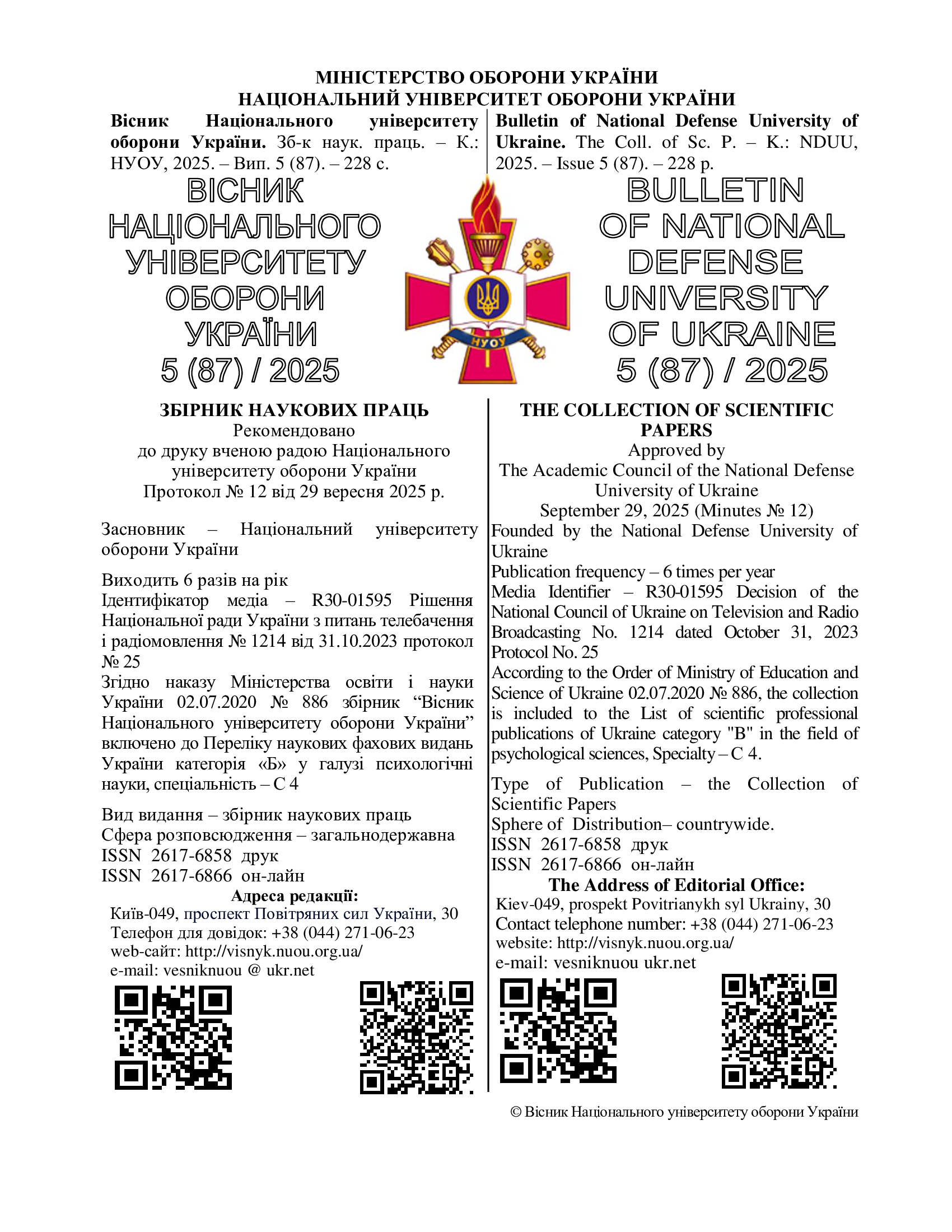ОСОБЛИВОСТІ НАДАННЯ ПСИХОЛОГІЧНОЇ ДОПОМОГИ ВІЙСЬКОВОСЛУЖБОВЦЯМ ЗБРОЙНИХ СИЛ УКРАЇНИ
DOI:
https://doi.org/10.33099/2617-6858-2025-87-5-61-71Ключові слова:
перша психологічна допомога, військово-професійна діяльність, військовослужбовець, стратегії подолання стресових подій, соціальні зв’язки, соціальна взаємодія.Анотація
Introduction. In the context of the current war in Ukraine, it is important to study the psychosocial factors that influence the recovery of military personnel after traumatic events. War involves not only physical losses, but also deep psychological trauma that disrupts a person's basic notions of security, trust, and social connections. One of the most important factors in stabilizing the psycho-emotional state of military personnel after a traumatic event is quality social interaction. Social ties with comrades, family, and community not only provide a basic sense of belonging, but also act as an effective protective mechanism against isolation, post-traumatic disorders, and maladjustment. The need for emotional support and a safe social environment intensifies immediately after a critical event, in particular through physiological mechanisms (activation of affiliative behavior, release of oxytocin, reduction of cortisol). At the same time, individual differences among military personnel in their perception of support and the risks of inadequate or forced socialization in acute phases of stress should be taken into account. That is why the early restoration of interpersonal contact and the organization of interaction in a military environment should be key elements of psychological assistance.
The purpose of the article is to study the peculiarities of providing psychological assistance to servicemen of the Armed Forces of Ukraine after a traumatic event, focusing on the importance of social interaction as a key element of this assistance.
Research methods. The study used the following research methods: analysis and generalization of scientific results from research on the impact of social ties and group support on the process of restoring the mental state of military personnel after a traumatic event.
The scientific novelty of the study lies in the fact that it deepens and refines the theoretical and practical foundations for providing first psychological aid to servicemen of the Armed Forces of Ukraine. The research materials can be used in the professional training of military psychologists for the practical development of their professional competence, as well as in the educational process of higher military educational institutions.
Conclusions and prospects for further scientific research. A critical factor in the recovery of military personnel after experiencing stress and trauma is the system of social connections and interpersonal interaction. Support from comrades and other significant individuals is a powerful protective mechanism that helps to make sense of the experience, reduce feelings of loneliness, and integrate the traumatic event into one's personal history. The phenomenon of shared experience in extreme circumstances forms unique, deep bonds in small military groups, which become the main source of security and trust, and separation from which is perceived as a threat. Direct social interaction, including both verbal (sincere questions, talking through experiences) and nonverbal (tactile contact, supportive gaze) forms of communication, is particularly important in the context of first psychological aid. These elements contribute to “grounding,” distracting attention from negative experiences, strengthening the connection with reality, and reducing internal anxiety through physiological effects (oxytocin release, cortisol reduction). Thus, quality interpersonal relationships are not just an emotional need, but a fundamental basis for the psychological stability and resilience of military personnel, especially after traumatic events. They cushion the effects of stress, help restore basic trust in the world, and are a key resource for effective prevention and treatment of post-traumatic disorders. Prospects for further research lie in the implementation of a program of psychological diagnosis and training in the development of social ties and interpersonal interaction among servicemen of the Armed Forces of Ukraine.
Завантаження
Посилання
Hansen, I. (2024). Ya mozhu! Yak vporatysia zi stresom, dolaty trudnoshchi ta vyrishuvaty konflikty. Kyiv: ArtHuss, S.114
Herman, Dzh. (2015). Psykholohichna travma ta shliakh do vyduzhannia: naslidky nasylstva – vid znushchan u simi do politychnoho teroru. Lviv: Vydavnytstvo Staroho Leva, S. 416
Horbunova, V. V., Karachevskyi, A. B., Klymchuk, V. O., Netliukh, H. S., Romanchuk, O. I. (2016). Sotsialno-psykholohichna pidtrymka adaptatsii veteraniv ATO. Lviv: Instytut psykhichnoho zdorovia Ukrainskoho katolytskoho universytetu, S. 94
Vazhlyvi navychky v periody stresu: iliustrovane kerivnytstvo. (2020). Kopenhahen: Yevropeiskyi rehionalnyi ofis Vsesvitnoi orhanizatsii okhorony zdorovia, S. 126
Morhunov, O. A. (2022). Persha psykholohichna dopomoha v hostrykh stresovykh sytuatsiiakh: Navchalno-praktychnyi posibnyk. Kharkiv: Kharkivskyi natsionalnyi universytet vnutrishnikh sprav, S. 84
Matsehora, Ya. V., Vorobiova, I. V., Kolesnichenko, O. S., Prykhodko, I. I. (2015). Psykholohichnyi suprovid viiskovosluzhbovtsiv, yaki vykonuiut sluzhbovo-boiovi zavdannia v ekstremalnykh umovakh. Kharkiv, S. 69
Murti, V. (2023). Samotnist: syla liudskykh stosunkiv. Kyiv: Laboratoriia, S. 301
Osodlo V.I. (2021) Psykholohichna dopomoha viiskovosluzhbovtsiam. Kyiv: NUOU im. Ivana Cherniakhovskoho, S. 144 s.
Persha psykholohichna dopomoha : posibnyk dlia pratsivnykiv na mistsiakh. (2017) Kyiv: PULSARY, S. 64
Sapolski, R. M. (2020). Chomu zebry ne strazhdaiut na vyrazku. Kharkiv: Ranok; Fabula, S. 399
Semenov, A., Sabliash, Ya., Symonovskyi, I., (2022). Yak ty, brate? Posibnyk z psykholohichnoi vzaiemodopomohy dlia viiskovykh. Kyiv, S. 48
Semyhina, T., Pavlenko, I., Ovsiannikova, Ya., (2017). Okhorona psykhichnoho zdorovia v umovakh viiny. Kyiv: Nash Format, S. 1067
Ulianov, K. (2024). Bronovanyi rozum: Boiovyi stres ta psykholohiia ekstremalnykh sytuatsii. Kyiv: Biznes Lohika, S. 320
Kisarchuk, Z. H., Omelchenko, Ya. M., Lazos, H. P., Lytvynenko, L. I., Tsarenko, L. H. (2015). Psykholohichna dopomoha postrazhdalym vnaslidok kryzovykh travmatychnykh podii: Metodychnyi posibnyk. Kyiv: TOV “Vydavnytstvo Lohos”, S.207
Kokun O.M., Ahaiev N.A., Pishko I.O., Lozinska N.S. (2015) Osnovy psykholohichnoi dopomohy viiskovosluzhbovtsiam v umovakh boiovykh dii: – Kyiv: NDTs HP ZSU, S. 170
Yunger, S. (2023). Plemia: Pro povernennia z viiny i nalezhnist do spilnoty. Kyiv: Nash Format, S. 125
##submission.downloads##
Опубліковано
Як цитувати
Номер
Розділ
Ліцензія
Авторське право (c) 2025 Вісник Національного університету оборони України

Ця робота ліцензується відповідно до Creative Commons Attribution-NonCommercial-ShareAlike 4.0 International License.





